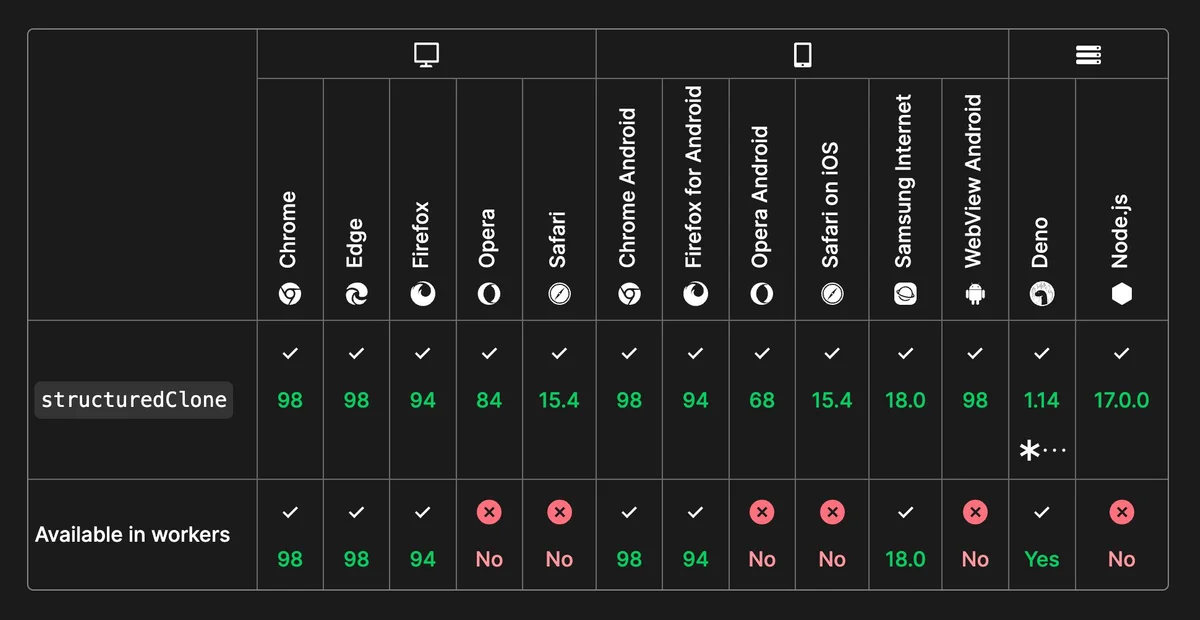对象深拷贝在JavaScript中的现代实现
你是否知道,现在有一种原生方式去实现JavaScript中的 深拷贝 ?
没错,那就是structuredClone函数,它被内置在JavaScript运行时:
const calendarEvent = {
date: new Date(123),
attendees: ["Steve"]
}
const copied = structuredClone(calendarEvent)
你是否注意到,在上面这个例子中我们不仅克隆了对象,同时也克隆了嵌套数组、甚至是日期对象?
并且一些像是我们期望的那样精准运行:
copied.attendees // ["Steve"]
copied.date // Date: Wed Dec 31 1969 16:00:00
cocalendarEvent.attendees === copied.attendees // false
没错,structuredClone不仅如此,还支持:
- 无限嵌套的对象或数组
- 循环引用
- 各类数据结构,如
Date,Set,Map,Error,RegExp,ArrayBuffer,Blob,File,ImageData... - 转移任意的可转移对象
例如这个例子:
const kitchenSink = {
set: new Set([1, 3, 3]),
map: new Map([[1, 2]]),
regex: /foo/,
deep: { array: [ new File(someBlobData, 'file.txt') ] },
error: new Error('Hello!')
}
kitchenSink.circular = kitchenSink
// ✅ All good, fully and deeply copied!
const clonedSink = structuredClone(kitchenSink)
为什么不使用对象扩展符?
需要注意的是,我们当下讨论的是深克隆。如果你只需要做一个浅克隆(shallow copy),换言之不去拷贝那些嵌套对象或数组,我们可以直接使用对象扩展符:
const simpleEvent = {
}
// ✅ no problem, there are no nested objects or arrays
const shallowCopy = {...calendarEvent}
或者其他,看你的喜好:
const shallowCopy = Object.assign({}, simpleEvent)
const shallowCopy = Object.create(simpleEvent)
但一旦嵌套了对象,就会产生问题:
const calendarEvent = {
date: new Date(123),
attendees: ["Steve"]
}
const shallowCopy = {...calendarEvent}
// 🚩 oops - we just added "Bob" to both the copy *and* the original event
shallowCopy.attendees.push("Bob")
// 🚩 oops - we just updated the date for the copy *and* original event
shallowCopy.date.setTime(456)
如你所见,我们并未完全的复制这个对象。
嵌套Date对象和数组依然被两者共享引用,编辑其中一个,另外一个也会改变,这将带来重大隐患。
为什么不用JSON.parse(JSON.stringify(x))?
这确实是一个很好的技巧,并且它的性能出乎意料的好,但对比 structuredClone 依然有一些不足之处。
让我们看这个例子:
const calendarEvent = {
date: new Date(123),
attendees: ["Steve"]
}
// 🚩 JSON.stringify 将 `date` 转换成了字符串
const problematicCopy = JSON.parse(JSON.stringify(calendarEvent))
如果我们打印 problematicCopy,我们会得到:
{
date: 1970-01-01T00:00:00.123Z
attendees: ["Steve"]
}
这不是我们想要的!date应该是一个Date对象,而不是字符串。
这是因为JSON.stringify只能处理基本对象、数组和原始类型。其他类型的处理方式难以预测。例如,日期被转换为字符串。而Set则简单地被转换为{}。
JSON.stringify甚至完全忽略某些东西,比如undefined或函数。
例如,如果我们用这种方法复制我们的kitchenSink示例:
const kitchenSink = {
set: new Set([1, 3, 3]),
map: new Map([[1, 2]]),
regex: /foo/,
deep: { array: [ new File(someBlobData, 'file.txt') ] },
error: new Error('Hello!')
}
const veryProblematicCopy = JSON.parse(JSON.stringify(kitchenSink))
我们会得到:
{
"set": {},
"map": {},
"regex": {},
"deep": {
"array": [
{}
]
},
"error": {},
}
这有点……
哦,对了,我们还得移除对象上原有的循环引用,因为JSON.stringify在遇到这种情况时会直接抛出错误。
所以虽然这种方法在我们的需求符合它能做到的情况下很棒,但还有很多structuredClone可以做到而这种方法做不到的事情(就像上面我们失败的)。
为什么不用 _.cloneDeep?
到目前为止,Lodash的cloneDeep函数一直是这个问题的一个很常见的解决方案。
实际上,它确实如预期那样工作:
import cloneDeep from 'lodash/cloneDeep'
const calendarEvent = {
date: new Date(123),
attendees: ["Steve"]
}
const clonedEvent = cloneDeep(calendarEvent)
但是,这里只有一个小问题。根据我IDE中的Import Cost扩展(它会打印我导入的任何东西的kb成本),这一个函数就占用了整整17.4kb的压缩大小(gzip压缩后5.3kb):
而且这假设你只导入了那个函数。如果你用更常见的方式导入,没有意识到tree shaking并不总是如你所希望的那样有效,你可能会意外地仅为这一个函数就导入高达25kb 😱
虽然这对任何人来说都不会是世界末日,但在我们的情况下这是无意义的,尤其是当浏览器已经内置了structuredClone的时候。
structuredClone不能克隆的东西
函数无法被克隆
它将会抛出一个 DataCloneError:
// 🚩 Error!
structuredClone({ fn: () => { } })
DOM 节点
同样会抛出一个 DataCloneError:
// 🚩 Error!
structuredClone({ el: document.body })
属性描述符、setter、getter
同样,对象的类元数据也不会被克隆。
在这个例子中,使用getter会克隆其返回值,但不会克隆getter函数本身(或任何元数据属性)。
structuredClone({ get foo() { return 'bar' } })
// Becomes: { foo: 'bar' }
对象原型
原型链不会被遍历或复制。因此如果你克隆一个MyClass类的实例,克隆对象将不再被识别成这个类的实例(但是这个类的有效属性都将被复制)。
class MyClass {
foo = 'bar'
myMethod() { /* ... */ }
}
const myClass = new MyClass()
const cloned = structuredClone(myClass)
// Becomes: { foo: 'bar' }
cloned instanceof myClass // false
所有支持类型的列表
Array, ArrayBuffer, Boolean, DataView, Date, Error types (those specifically listed below), Map , Object but only plain objects (e.g. from object literals), Primitive types, except symbol (aka number, string, null, undefined, boolean, BigInt), RegExp, Set, TypedArray
Error types
Error, EvalError, RangeError, ReferenceError , SyntaxError, TypeError, URIError
AudioData, Blob, CryptoKey, DOMException, DOMMatrix, DOMMatrixReadOnly, DOMPoint, DomQuad, DomRect, File, FileList, FileSystemDirectoryHandle, FileSystemFileHandle, FileSystemHandle, ImageBitmap, ImageData, RTCCertificate, VideoFrame
浏览器与运行时支持
并且这是最棒的一点——structredClone被所有主流浏览器甚至Node.js和Deno所支持。
如图:

